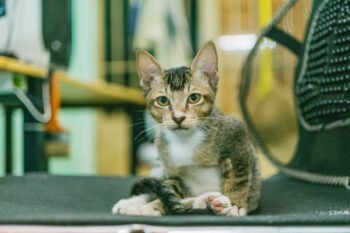Cats are notoriously stoic. It’s rare for them to show any obvious sign of illness. “As a general rule, any
major or sudden change in a cat’s usual activities and patterns
requires some investigation,” says Wendy Christensen, author of Outwitting Cats: Tips, Tricks and Techniques for Persuading the Felines in Your Life That What YOU Want is also What THEY Want (The Lyons Press). Here, an inside look at clues that your cat may be under the weather:
Pay attention to unexplained weight changes A pound or two
for a cat is the equivalent of 10 or 20 pounds for us. And, if the
weight change is rapid, the situation calls for veterinary attention,
warns Christensen. A sudden gain or loss may signal cancer, kidney and
liver disease, hyperthyroidism and several other conditions.
Note changes in eating habits, too If your pet turns up its
nose after a few bites, it might simply be that new food you bought.
“But disinterest in eating can also happen when a cat is under stress
— maybe some change is happening in your household — experiencing
tooth pain or tongue ulcers, dealing with hot or humid weather, or
battling something more serious such as an upper respiratory problem,
kidney failure, liver disease, diabetes, bowel disease, heart disease,
cancer or feline leukemia,” according to Christensen. So if your cat’s
food cutback or refusal to eat lasts longer than a couple of days, call
your vet.
Be aware of drinking and urinating patterns These activities
can indicate how well the kidneys are functioning. Often, excess
drinking and urinating are the first signs of chronic kidney disease,
since the kidneys may not be properly filtering toxins. “With
veterinary care, diet adjustment and possibly medication, chronic
kidney disease is a manageable condition, but it’s best to catch it
early,” says Christensen.
Note elimination patterns If your cat is eliminating outside
its litter box in significantly smaller or larger amounts than normal,
or voiding blood, it may be a sign of medical or behavioral issues. See
a vet for an evaluation. “Feline elimination problems, unaddressed,”
warns Christensen, “tend to get worse, not better.”
Be aware of head shaking and ear scratching This can indicate
ear mites (a parasite) or a bacterial or fungal infection — a
veterinarian can tell the difference. Don’t try to diagnose this
yourself, urges Christensen. “If it’s mites and you treat for
infection, your entire house can quickly be infested.”
Don’t ignore kitty halitosis Persistent bad breath can point
to a variety of illnesses, including kidney failure and
gastrointestinal problems. It’s not just a cosmetic issue, says
Christensen. It needs veterinary attention.
Note changes in vocalization A silent cat who suddenly cries
and calls at all hours, or a talky cat who’s suddenly mute, may be
experiencing pain, stress or confusion. Pay your vet a visit.
Take quick action if your cat bumps into things, has dilated pupils, and seems ill-at-ease in familiar environments All of these symptoms can indicate sudden blindness, says Christensen. Contact your veterinarian immediately.







